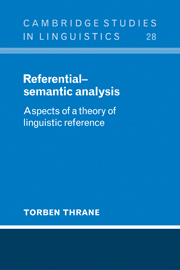Summary
Introductory
In §7.3.4 (7:13) the pronouns were displayed in a tabulation which was based on two criteria: the number of referential phrases in the referential structure that generates them, and the minimal structure (simple or complex) required for their derivation. With respect to these criteria I shall in the present chapter speak about three subtypes of pronouns: simple categorial, simple non-categorial, and complex pronouns. A simple categorial pronoun is a pronoun deriving from a simple structure in which gen-L is present, a simple non-categorial pronoun is one deriving from a simple structure in which gen-L is absent, and a complex pronoun is a (categorial or non-categorial) pronoun deriving from (the lower branch in) a complex structure. In addition, simple non-categorial pronouns may be either definite or indefinite. In contrast, simple categorial and complex pronouns are always definite.
Categorial vs. non-categorial: evidence for the distinction
Consider the following statement from Hjelmslev (1937: 198): ‘ego et tū ne sont que deux formes paradigmatiques d'un même pronom’ If we accept this statement we reduce what is at first sight a three-fold distinction between first (I), second (II), and third (III) person to a twofold distinction between I + II as against III.
There are two good reasons to accept Hjelmslev's statement. In the (Indo-European) languages with gender distinctions – either in the system of personal pronouns or in the nominal system in general – I and II are characterized by being insensitive to gender.
- Type
- Chapter
- Information
- Referential-Semantic AnalysisAspects of a Theory of Linguistic Reference, pp. 206 - 237Publisher: Cambridge University PressPrint publication year: 1980

